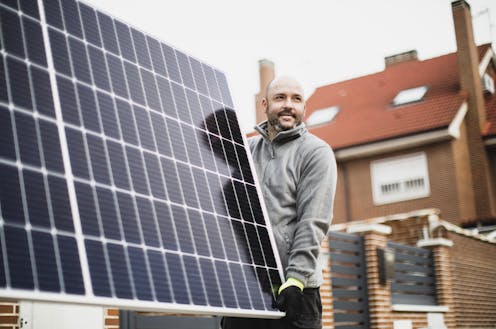Americans support climate change policies, especially those that give them incentives and clean up the energy supply
- Written by Janet K. Swim, Professor of Psychology, Penn State

As the Biden administration tries to build support for new climate and energy policies, a set of studies offers some insights that could help them appeal to the widest audience.
We are social[1] scientists[2] who examine how people think about climate change solutions. In the studies[3], we explored how the public responds to different types of policies and why some are likely to be more popular than others.
For example, which is better: incentives to cut emissions, such as rebates for installing solar panels, or disincentives, like a carbon tax? Does it matter whether those policies target individuals or businesses? What about policies that would reduce energy use or change energy sources from fossil to renewable energy?
Overall, we found people support climate change policies, but they have preferences among different types based on the policies’ anticipated environmental, economic and social impacts.
The who, what and how of climate policy
We used two different measures in two separate studies to assess U.S. residents’ reactions to a set of climate and energy policy types[4]. The 265 participants ranged in age from 18 to 80 and had an approximately equal likelihood of identifying themselves as Republican, Democrat or independent.
These policies varied in three crucial ways:
How they promoted change – through incentives, such as grants or rebates to encourage low-carbon actions, or disincentives, such as fees or taxes to discourage high-carbon actions.
Whom they targeted – businesses or individuals.
What they targeted – energy supply, such as switching to renewable sources, or energy demand, such as promoting energy efficiency and conservation.
The participants shared their preferences, but they also estimated the environmental, economic and social effects they thought each policy would have. Understanding the influence those estimates have on the participants’ views could help policymakers make less-popular policies more palatable.
Lesson 1: Incentives over disincentives
We found that people preferred policies with incentives rather than punishments – especially when the policies applied to individuals, but also for businesses.
They said they thought incentives would be better for the environment and have more economic and social net benefits than disincentives would.
However, we found greater tolerance of disincentives when they applied to businesses than when they affected individuals.
This tolerance was not a result of impressions of effects on the economy – in both cases, the participants anticipated greater economic benefits from incentives than disincentives.
Instead, participants appeared to think that trying to change individuals’ behaviors – but not businesses’ practices – with disincentives would have less positive social impact and be less effective. For example, about one-third of the respondents thought the disincentives for individuals would have more social harms than benefits, while only about 10% thought the same for other policy options.
Lesson 2: Clean energy is better than less energy
People also preferred policies that would change the supply of energy by increasing renewable energy and decreasing fossil fuels more than policies that would decrease the amount of energy people use.
The study participants thought increasing renewable energy and decreasing fossil fuel use would have greater economic and social benefits than decreasing the amount of energy used. For example, 87% percent indicated there would be more economic benefits than harms from energy supply policies, while 77% indicated the same for energy reduction policies.
We found that the participants’ political leanings had surprisingly little effect on relative preferences among all eight policies.
Our previous research[5] with University of Oklahoma postdoctoral fellow Lizbeth Benson also found that environmental benefits, and the anticipated economic consequences, considering both benefits and harms, affected which policies people support. Moreover, the anticipated human impact of climate policies – these could include health, food, safety and human well-being – was even more strongly associated with climate policy support.
The limitations of climate popularism
It may not always make sense[6] for politicians to promote the climate policy with the greatest public support.
For example, enacting some policies that penalize individuals for actions that emit a lot of greenhouse gases may be necessary to reach the world’s climate goals, despite their relative unpopularity.
Of course, a climate policy that doesn’t pass will not reduce carbon emissions at all.
Our work also suggests a possible path forward for promoting less-popular policies, such as those with disincentives for individuals or that reduce energy use. We found that these policies are less popular because people tend to believe they will be less effective and have less of a positive social impact.
Changing policies to increase their positive social impact[7] – a carbon tax that rebates the proceeds to citizens is an example – can help win public support.
Communication strategies can focus on successes to illustrate that people working together to reduce their energy can effectively reduce emissions. For instance, communities can learn from and be inspired by cities that have cut their emissions[8].
[More than 140,000 readers get one of The Conversation’s informative newsletters. Join the list today[9].]
References
- ^ social (scholar.google.com)
- ^ scientists (scholar.google.com)
- ^ the studies (doi.org)
- ^ set of climate and energy policy types (www.datawrapper.de)
- ^ Our previous research (doi.org)
- ^ may not always make sense (www.bloomberg.com)
- ^ increase their positive social impact (doi.org)
- ^ cities that have cut their emissions (www.bloomberg.com)
- ^ Join the list today (memberservices.theconversation.com)
















